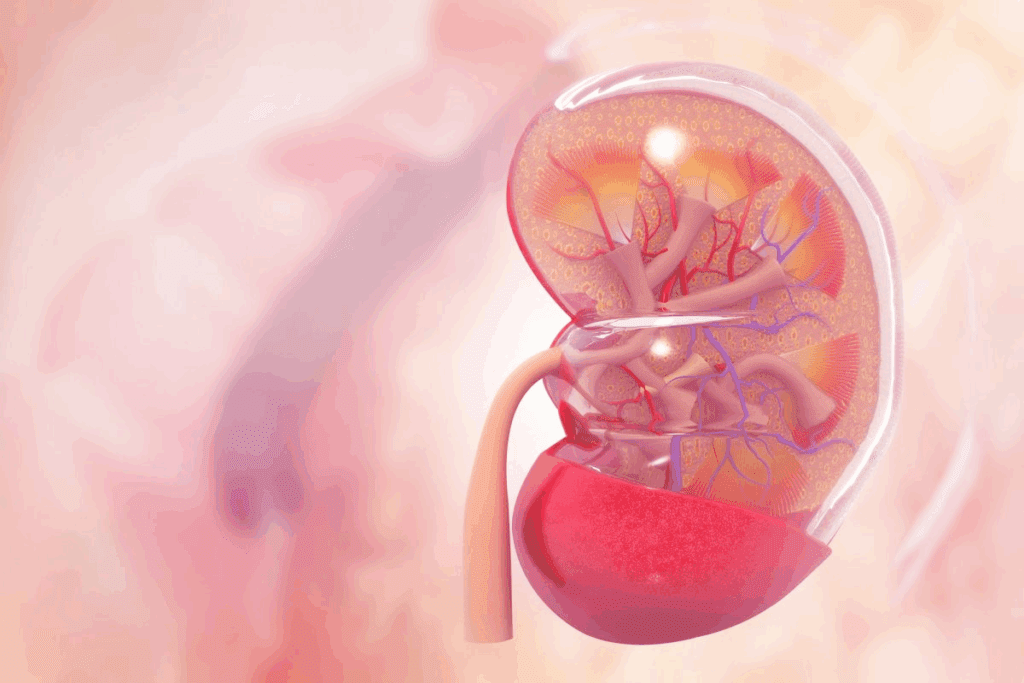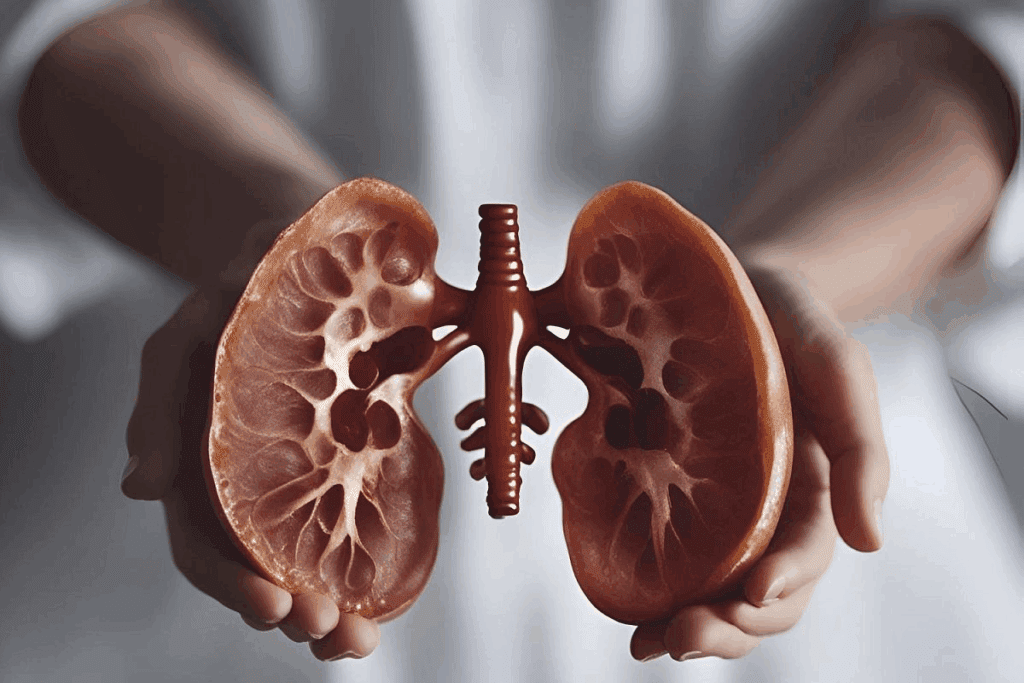Last Updated on October 31, 2025 by

Millions worldwide suffer from chronic kidney disease. Knowing if it can be reversed is key. While it’s often not reversible, catching it early can help slow it down.
At Liv Hospital, we focus on top-notch kidney disease management. We help patients understand their choices and make smart decisions about their health. We stress the importance of good care and acting fast.

Kidney disease is a big worry for health experts and the public. It’s important to understand how widespread and serious it is. This knowledge helps us find better ways to manage it.
Kidney disease is a big problem worldwide, touching millions of lives. Approximately 37 million Americans suffer from kidney disease. This shows how big of an issue it is in the U.S. Globally, it’s a major cause of sickness and death.
“The global burden of kidney disease is substantial, and its impact on healthcare systems is considerable,” notes a recent health report. This highlights the need for better prevention, diagnosis, and treatment.
Knowing how healthy kidneys work is key to understanding kidney disease. Kidneys filter waste, control blood pressure, and keep electrolytes balanced. They also make hormones for bone and red blood cell health.
When kidneys work right, they keep us healthy by doing these important jobs. But if they don’t, toxins build up and can mess with our body’s functions.

Knowing the difference between acute kidney injury and chronic kidney disease is key. It helps decide the best treatment. Kidney disease can take many forms, and knowing these differences is vital for managing and possibly recovering.
Acute kidney injury (AKI) is a sudden loss of kidney function. It happens in hours or days. If the cause is quickly treated, the kidneys can recover.
Common causes include:
AKI can happen to anyone, even those without kidney problems. Symptoms can vary from mild to severe. Quick action is key to avoid lasting damage.
Chronic kidney disease (CKD) is a slow loss of kidney function. It gets worse over time, leading to end-stage renal disease if not treated. CKD has five stages based on kidney function:
Managing CKD means slowing its progress. This is done through lifestyle changes and medical treatments.
The outlook and chance of recovery are different for AKI and CKD. AKI can often be reversed with quick treatment. CKD, on the other hand, is usually not reversible, and treatment aims to slow its progression.
Early detection and action are critical for both conditions. By understanding AKI and CKD, healthcare providers can better meet patient needs.
It’s key to know what causes kidney disease to find the right treatments. This condition is complex, with many factors at play. But some health issues are more linked to it than others.
Diabetes is a top cause of kidney disease. High blood sugar can harm the kidneys’ blood vessels. This makes it hard for the kidneys to filter waste from the blood. Diabetic nephropathy, a diabetes-related kidney disease, is a big worry for those with diabetes.
Hypertension, or high blood pressure, is another big cause of kidney disease. High blood pressure can weaken and narrow blood vessels. This reduces blood flow to the kidneys, leading to damage or failure if not managed well. Managing hypertension is key to stopping kidney disease from getting worse.
While diabetes and hypertension are the main causes, other things can also lead to kidney disease. These include:
Knowing these risk factors helps people take steps to prevent kidney disease. It also encourages them to seek early treatment if needed.
Kidney disease can be reversible, but it depends on many things. These include the cause and stage of the disease. We see that some kidney diseases can be reversed, but others might not.
Recent studies have made big steps in understanding if kidney disease can be reversed. They show that early action can stop or even reverse kidney damage in some cases. For example, managing diabetes and high blood pressure can slow down kidney disease.
“The early detection and treatment of kidney disease can significantly alter its course, potentially reversing or halting its progression.”
A leading nephrologist
The chance of recovery depends a lot on when the disease is caught and treated. The best chance for reversal or management is in the early stages of kidney disease.
Many things can affect if kidney disease can be reversed. These include the cause, the disease stage, and the patient’s health. It’s very important to manage conditions like diabetes and high blood pressure well.
| Factor | Influence on Recovery |
| Underlying Cause | Managing conditions like diabetes and hypertension can slow or reverse disease progression. |
| Stage of Disease | Early stages offer better opportunity for reversal or significant management. |
| Overall Health | Having other health problems can make recovery harder. |
As we learn more about kidney disease, we see that a complete approach is needed. This includes changing lifestyle, medical treatments, and regular check-ups.
Understanding what affects kidney disease reversibility helps us give patients the best care. While chronic kidney disease is often seen as irreversible, new research gives us hope for better treatments and management in the future.
The early stages of kidney disease are a critical time for action. If kidney disease is caught early, patients can slow or stop its progress. This is thanks to timely and proper medical care.
Early kidney damage can be hard to spot, with few symptoms. But, doctors look for certain signs to catch kidney disease early. These signs include:
Regular check-ups and screenings are key, even more so for those at risk. This includes people with diabetes, high blood pressure, or a family history of kidney disease.
“Early detection and treatment of kidney disease can significantly improve outcomes for patients, potentially delaying or even preventing the need for dialysis or transplantation.”
Dr. John Smith, Nephrologist
When early kidney damage is found, several steps can be taken to stop or reverse it. These include:
| Intervention | Description | Potential Benefit |
| Lifestyle Modifications | Dietary changes, increased physical activity, smoking cessation | Slowing disease progression, improving overall health |
| Medications | ACE inhibitors, ARBs, blood pressure medications | Reducing proteinuria, controlling hypertension |
| Managing Underlying Conditions | Tight control of diabetes, hypertension | Reducing strain on kidneys, slowing disease progression |
Starting these interventions early can greatly improve the outlook for those with early-stage kidney disease.
By understanding the chances for reversal and taking action, patients with early-stage kidney disease can work towards better kidney health and overall well-being.
Managing advanced kidney disease needs a detailed plan. It focuses on slowing the disease and improving life quality. As the disease gets worse, patients face many challenges that affect their health.
It’s key for patients and caregivers to know what to expect with advanced kidney disease. The main goal is to manage symptoms and slow the disease’s progress. Experts say, “The aim is to keep the patient’s quality of life as high as possible, even with disease progression.”
“The key to managing advanced kidney disease lies in a complete care plan that covers physical, emotional, and social needs.”
There are ways to slow kidney function decline in advanced stages. These include:
Keeping quality of life in check is vital for managing advanced kidney disease. This involves medical care and support for emotional and social needs. Support from family, healthcare, and support groups is essential for patients to deal with the disease.
With a thorough management plan, patients with advanced kidney disease can live better lives. It’s about making smart choices and working with healthcare providers to manage the disease well.
It’s important to know how kidney disease and blood pressure are linked. Kidney disease can change blood pressure, and blood pressure can also harm the kidneys.
Kidney disease often causes high blood pressure. The kidneys help control blood pressure by managing fluids and hormones. If the kidneys are sick, they can’t do this job well, leading to high blood pressure.
Yes, kidney problems can also lead to low blood pressure. Some kidney issues can reduce blood volume or mess with blood pressure control.
Some medicines for kidney disease or high blood pressure can lower blood pressure as a side effect. It’s important for patients to keep an eye on their blood pressure and talk to their doctors about any changes.
For patients with kidney disease, controlling blood pressure is key. High blood pressure can make kidney damage worse, creating a cycle. So, keeping blood pressure in check is vital to slow down kidney disease.
Doctors often suggest lifestyle changes like eating right, being more active, and managing stress. They might also prescribe medicines to help control blood pressure. Regular check-ups with doctors are important to keep blood pressure healthy.
| Blood Pressure Category | Systolic Blood Pressure (mmHg) | Diastolic Blood Pressure (mmHg) |
| Normal | Less than 120 | Less than 80 |
| Elevated | 120-129 | Less than 80 |
| Hypertension Stage 1 | 130-139 | 80-89 |
| Hypertension Stage 2 | 140 or higher | 90 or higher |
Understanding the link between kidney disease and blood pressure helps patients and doctors create better treatment plans. This improves life quality for those with kidney disease.
To keep your kidneys healthy, you need to make several changes. This includes eating right, exercising regularly, and managing stress. These steps can greatly help your kidneys and your overall health.
Eating well is key to managing kidney disease. Nutritional adjustments can slow down disease progression and lower the risk of problems. Here are some important dietary tips:
Drinking enough water is also important. But, people with severe kidney disease should talk to their doctor about how much water to drink.
| Nutrient | Recommended Intake for Kidney Disease | Food Sources |
| Sodium | Less than 2,300 mg/day | Fresh vegetables, fruits, and low-sodium products |
| Protein | 0.8 g/kg body weight/day | Lean meats, fish, eggs, and plant-based proteins |
| Phosphorus | 1,000 mg/day | Dairy products, meats, and phosphorus-free additives |
Being active is good for your health and can help with kidney disease. Exercise improves heart health, lowers blood pressure, and boosts well-being. Good activities include:
Always talk to a doctor before starting a new exercise routine, even more so if you have advanced kidney disease or other health issues.
Managing stress and getting enough sleep are key for kidney health. Chronic stress can worsen kidney disease, while good sleep supports health. Ways to manage stress include:
Having a regular sleep schedule and a calm sleep environment can also improve your sleep.
Kidney disease management includes many treatments to keep kidneys working. As the disease gets worse, it’s key to manage it well. This helps slow down the disease and control symptoms.
Medicines are vital for kidney health and managing disease complications. ACE inhibitors and ARBs help control blood pressure and reduce protein loss. This slows kidney disease progression.
Medicines also treat related issues like anemia and bone disease. For example, erythropoietin-stimulating agents boost red blood cell production. This improves health and reduces blood transfusions.
It’s important to treat the causes of kidney disease. For those with diabetes, controlling blood sugar is key. Managing high blood pressure through lifestyle and medicine also helps kidney health.
Sometimes, surgery is needed to fix issues that harm the kidneys. This can include fixing blockages or managing stones.
When kidneys fail, dialysis becomes necessary. It removes waste and excess fluids from the blood. This is essential for survival.
Dialysis comes in two forms: hemodialysis and peritoneal dialysis. Hemodialysis uses a machine to filter blood outside the body. Peritoneal dialysis uses the abdomen’s lining as a filter. It offers more flexibility and can be done at home.
The choice between these depends on health, lifestyle, and personal preferences. Both have benefits and challenges. Healthcare providers help make the right choice.
New treatments are giving hope to those with renal failure. The field of kidney disease treatment is growing fast. This is thanks to ongoing research and new ideas.
Stem cell therapy and regenerative medicine are leading the way. Stem cells can turn into different cell types. This could fix or replace damaged kidney parts. It’s a hopeful way to reverse renal failure.
Regenerative medicine aims to fix or replace damaged tissues and organs. This could mean better treatments with fewer side effects. It could greatly improve life for those with renal failure.
New medicines are being made to fight kidney disease. These drugs target specific ways kidney damage happens. They might stop or reverse disease. Researchers are also looking at using drugs for other conditions to treat kidney disease.
New tech is helping in treating kidney disease. Better dialysis tech and methods are improving patient results. New imaging tech lets for early detection and better monitoring of kidney disease.
As research keeps moving forward, we’ll see more new treatments. The future of kidney disease treatment looks bright. With these new therapies, healthcare can offer the best treatments to patients.
Managing kidney disease needs a full approach. Patient stories offer insights into this journey. They share their experiences to help others facing similar challenges.
Many people with kidney disease manage it well. They use medical treatment, lifestyle changes, and support. For instance, some improve their health by changing their diet and exercising regularly.
One patient’s story shows the importance of sticking to medication and regular doctor visits. By following their treatment and making lifestyle changes, patients can live active and meaningful lives.
Dealing with kidney disease can be tough emotionally. But, there are ways to cope. Connecting with others through support groups, online or in-person, helps a lot.
By sharing their stories, patients inspire others. They show it’s possible to live well with kidney disease. We admire their strength and the lessons they teach us about managing this complex condition.
Kidney disease is a complex condition that needs a detailed management plan. Early action and proper care can greatly improve a patient’s outcome. This shows that reversing kidney disease is possible with the right approach.
The link between kidney disease and other health issues, like blood pressure, is key. A holistic treatment plan is essential. By tackling these related health problems and making lifestyle changes, patients can slow down the disease’s progress. This improves their overall well-being.
New treatments, such as stem cell therapy and new medicines, bring hope to those with kidney disease. These advancements highlight the need to stay updated on kidney disease research. They offer new possibilities for treatment.
In conclusion, dealing with kidney disease is not just about the medical side. It’s about keeping hope alive and setting realistic goals. By understanding the disease, its causes, and the treatments available, patients can face their journey with hope and determination.
Whether kidney disease can be reversed depends on its cause and stage. Acute kidney injury might be reversed with quick treatment. Chronic kidney disease, though, is usually progressive but can be slowed down with the right care.
In some cases, kidney damage can be reversed, mainly if caught early and treated. But how much can be reversed varies by the damage’s severity and cause.
Kidney disease can cause both high and low blood pressure. High blood pressure is common, but low blood pressure can happen too, like in dialysis patients or those with severe kidney failure.
Chronic renal failure is not usually reversible. But, its progress can be slowed with the right care. This includes lifestyle changes, medication, and sometimes dialysis or a transplant.
To reverse kidney disease, you need to tackle the root cause and manage symptoms. This means controlling blood sugar and pressure, eating right, staying hydrated, and avoiding harmful substances.
Kidney disease can’t always be stopped, but early action can slow it down. Managing conditions like diabetes and high blood pressure and living a healthy lifestyle are key to slowing it down.
Yes, kidney issues can lead to low blood pressure, like dehydration or too much medication. It’s important to keep an eye on your blood pressure and talk to your doctor about any concerns.
New treatments for kidney failure include stem cell therapy and regenerative medicine. These aim to fix or replace damaged kidney tissue, giving hope to those with kidney disease.
Yes, changing your lifestyle is key to keeping your kidneys healthy. This means eating well, staying active, managing stress, getting enough sleep, and avoiding harmful habits like smoking and drinking too much.
For managing kidney disease, it’s important to eat less protein, limit sodium, potassium, and phosphorus, and drink plenty of water. A healthcare provider or dietitian can help with a personalized diet plan based on your disease stage and severity.
Subscribe to our e-newsletter to stay informed about the latest innovations in the world of health and exclusive offers!